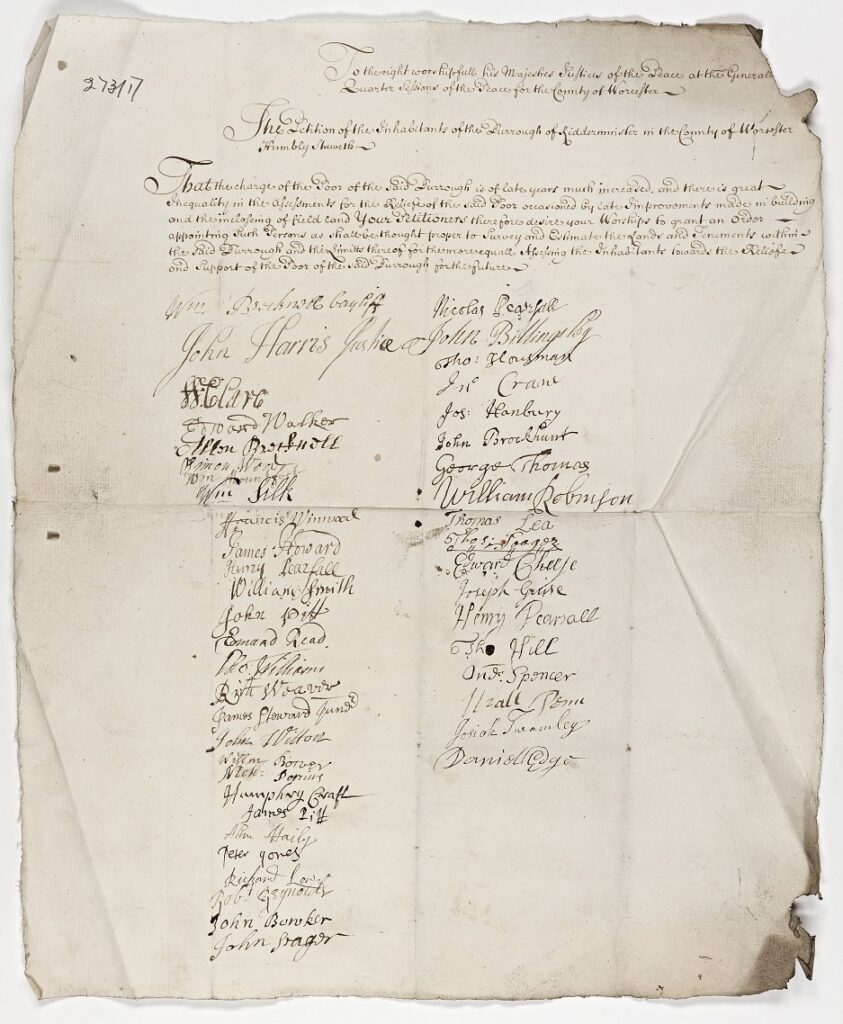Brodie Waddell and Sharon Howard
In eighteenth-century England, ordinary people regularly petitioned county and city magistrates about personal calamities or local problems. These requests survive in huge numbers in local archives, including nearly ten thousand for London alone. Analysing such petitions allows us to better understand social relations, economic hardship and the role of the state in this period as well as the outlook and circumstances of people who lacked any official authority of their own. Which issues drove people to complain? How did they frame their requests? How did such petitioning vary by geography, chronology, gender and social status?
We’re very pleased to announce that we have just been jointly awarded an Economic History Society Carnevali Small Research Grant of nearly £3,000 to gather material to help to answer these questions. This new research will photograph, transcribe and analyse a substantial selection of eighteenth-century petitions, building on Brodie and Sharon’s current projects, namely ‘The Power of Petitioning in Seventeenth-Century England’ (c.1580-1700) and ‘The London Lives Petitions Project’ (c.1690-1800). Both these projects are creating or using large collections of transcribed manuscripts to undertake quantitative analysis of petitioning. However, comparing material from these projects to draw broader conclusions is currently impossible because they cover different chronologies and jurisdictions. This grant from the Economic History Society will enable us to bridge this divide by collecting, transcribing and analysing six key collections that will link these two projects, and so create a diverse publicly-available corpus of petitions stretching across more than two centuries.
For social and economic historians, this research will provide a wide-ranging survey of the challenges and hardships faced by people of all ranks while also illuminating the determined reactions they provoked. Preliminary research suggests that the most common petitions to local magistrates were appeals for temporary aid or long-term poor relief, allowing glimpses of material hardship from a variety of different perspectives: labourers afflicted by old age or disabilities, families suffering the loss of a bread-winner, householders rendered homeless by fire or flood, traders facing insurmountable debts, and many other victims of sudden immiseration.
Yet, while this type of petition is both valuable and numerous, it is hardly the only form available for examination. Others illuminate problems associated with early modern trade and labour practices such as the pleas from imprisoned debtors seeking freedom, from workers desperate for unpaid wages, and from apprentices seeking to be released from failed or abusive masters. Moreover, many petitions came from organised groups rather than from isolated individuals. Collective requests from whole parishes frequently asked for the expulsion of poor migrants, for relief from taxation or for funds to maintain local roads and bridges. Examining a broad selection of these documents will provide insight into the nature of local economic and social problems in this period.
For scholars studying the history of England’s state structure, the project will reveal one of the primary ways in which ordinary people addressed and shaped these developing institutions. Specifically, it will offer an alternative perspective on the nature of state authority in the localities. Current understandings of formal power structures in eighteenth-century England have been drawn primarily from the writings of theorists or officeholders. In contrast, petitions provide a view of authority ‘from below’.
The petitions sent to local magistrates in the eighteenth century represent immensely valuable source material for historians of social and economic history. Although several scholars have already used them to examine specific issues in particular jurisdictions, the Economic History Society grant will enable us to undertake the first methodical analysis of these sources over a broad geographical and chronological range. It will substantially enhance the benefits of our existing separate projects while also creating an online resource that will offer a new perspective on eighteenth-century England for all interested researchers.

Our Plans
This grant will fund the costs of photographing and transcribing more than 400 petitions from six different jurisdictions, with collections chosen to align with the data created by the two other projects and taking full advantage of existing material. Specifically, this will include the quarter sessions of Cheshire, Derbyshire, Hertfordshire, Staffordshire, Westminster, and Worcestershire. Gavin Robinson, who is currently working on our AHRC project, will undertake the transcriptions. It is on a much smaller scale than the AHRC project, so it will simply run alongside it in 2019-20.
The grant will also include the cost of partnering with the IHR Digital team to add these texts to the online editions of transcriptions being created for the AHRC-funded project, which will be published on British History Online. Using XML mark-up, the transcriptions will be easily searched or analysed by date, people, place and gender. The full texts will also enable Natural Language Processing to track textual patterns. Moreover, integrating the transcriptions into British History Online will ensure their discoverability and sustainability. Existing users of this well-known platform – which received two million unique visitors in 2017 – will be able to seamlessly search the whole corpus alongside the 1,289 volumes of historical material already on the site. With the combined support of the AHRC and the Economic History Society, we will create an entirely free digital resource which will make publicly available full transcriptions of approximately 2,500 petitions from c.1580 to c.1800 for use by researchers, students, teachers and others.
We’ll provide updates on our progress on The Power of Petitioning blog and on twitter via #PowerOfPetitioning. Please get in touch if this is something you’re interested in, as we are always keen to collaborate!
